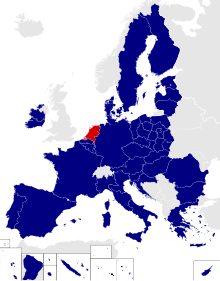Dutch withdrawal from the European Union: Difference between revisions
Citation bot (talk | contribs) Alter: url. URLs might have been internationalized/anonymized. Add: work. Removed parameters. Some additions/deletions were actually parameter name changes. | You can use this bot yourself. Report bugs here. | Suggested by AManWithNoPlan | All pages linked from cached copy of User:AManWithNoPlan/sandbox2 | via #UCB_webform_linked 1651/3786 |
Koopinator (talk | contribs) Undid revision 968326317 by John Maynard Friedman (talk) The source actually gives 49% vs 33%, with 10% undecided. See page 10 of archived version here: https://web.archive.org/web/20201026061532/https://www.tns-sofres.com/sites/default/files/2016.06.06-brexit.pdf |
||
| Line 93: | Line 93: | ||
|981 |
|981 |
||
|{{yes|'''49%'''}} |
|{{yes|'''49%'''}} |
||
| |
|33% |
||
|18% |
|18% |
||
| style="background:green;color:white;" | |
| style="background:green;color:white;" |16% |
||
|- |
|- |
||
| data-sort-value="2016-03-07" |4–7 March 2016 |
| data-sort-value="2016-03-07" |4–7 March 2016 |
||
Revision as of 19:25, 1 December 2020

Dutch withdrawal from the European Union (colloquially "Nexit", a portmanteau of "Netherlands" and "exit") refers to the hypothesis that the Netherlands might withdraw from the European Union.[1] As of 2020[update], with opinion polls showing a 3:1 majority against the idea, no such withdrawal is in prospect.
Political initiatives
Dutch Prime Minister Mark Rutte called the possibility of a referendum "utterly irresponsible" and dangerous to the country.[1] Political parties advocating a referendum on European Union membership are the right-wing populist[2][3] Party for Freedom, Forum for Democracy,[4] as well as the Libertarian Party and 50PLUS.[5]
Public opinion
| Date(s) conducted | Polling Firm | Sample | Remain | Leave | Undecided | Lead |
|---|---|---|---|---|---|---|
| 5–9 June 2020 | I&O Research | 1,638 | 75% | 25% | — | 50% |
| 19–24 April 2019 | I&O Research | 2,510 | 72% | 16% | 12% | 56% |
| 25–28 March 2019 | EenVandaag | 27,652 | 64% | 29% | 7% | 37% |
| 18–22 January 2019 | I&O Research | 2,510 | 72% | 18% | 10% | 54% |
| 11–13 September 2018 | Ipsos | 1,017 | 55% | 21% | 24% | 34% |
| 6 March – 7 April 2017 | Pew Research | 1,006 | 80% | 18% | 2% | 62% |
| 5–7 July 2016 | EenVandaag | 25,681 | 53% | 39% | 8% | 14% |
| 23 June 2016 | The United Kingdom votes to leave the EU. | |||||
| 10–20 June 2016 | EenVandaag | 27,000 | 45% | 48% | 7% | 3% |
| 27–31 May 2016 | TNS Public Affairs | 981 | 49% | 33% | 18% | 16% |
| 4–7 March 2016 | I&O Research | 2,510 | 67% | 22% | 11% | 45% |
Polling
A poll in the Netherlands by the Pew Research Center in June 2016, conducted before the British referendum which led to the withdrawal of the UK from the EU, found 51% of the Dutch respondents to have a positive view of the European Union and 46% a negative view.[6] Another poll by peil.nl in the aftermath of the 2016 British referendum found 50% of the respondents to be against a similar referendum in their country, with 46% of those in favour of remaining in the EU compared to 43% overall against remaining.[1]
See also
- Danexit
- Frexit (French withdrawal from the EU)
- Romanian withdrawal from the European Union
- Greek withdrawal from the eurozone (Grexit)
- Euroscepticism
References
- ^ a b c Lyons, Kate (27 June 2016). "Frexit, Nexit or Oexit? Who will be next to leave the EU". The Guardian. Retrieved 28 June 2016.
- ^ Pauwels, Teun (2014). Populism in Western Europe: Comparing Belgium, Germany and The Netherlands. Routledge. pp. 117–118. ISBN 9781317653912.
- ^ Merijn Oudenampsen (2013). "Explaining the Swing to the Right: The Dutch Debate on the Rise of Right-Wing Populism". In Ruth Wodak, Majid KhosraviNik, Brigitte Mral. Right-Wing Populism in Europe: Politics and Discourse. A&C Black. p. 191.
- ^ "Forum voor Democratie". Forumvoordemocratie.nl. 31 December 2016. Retrieved 23 February 2017.
- ^ Kees Pieters (15 June 2016). "Zo denkt politiek Den Haag over een NEXIT-referendum". Politiek.tpo.nl. Retrieved 22 September 2018.
- ^ "Euroscepticism on rise in Europe, poll suggests". BBC News. 6 June 2016. Retrieved 28 June 2016.
External links
- "Dijsselbloem: PVV 'bestelt' anti-EU-rapporten" [Dijsselbloem: PVV 'orders' anti-EU reports]. de Volkskrant (in Dutch). 6 February 2014. Retrieved 15 February 2019.
- Meeus, Tom-Jan (17 November 2018). "Hoe de Nexit-aanhangers ineens hun luidruchtigheid zijn verloren" [How the Nexit supporters suddenly stopped being noisy]. NRC Handelsblad (in Dutch). Retrieved 15 February 2019.
